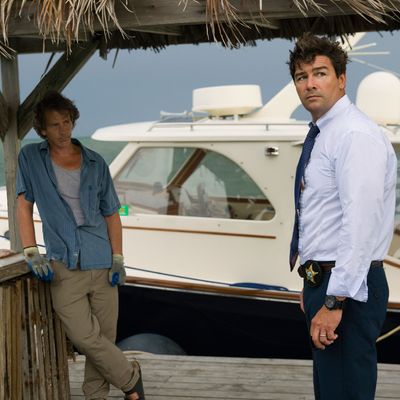
Bloodline is a real orgy of prestige: Sissy Spacek and Sam Shepard and Kyle Chandler! From the people who brought you Damages! It’s on Netflix, ooooh. And it’s a dark, broody family drama with disorienting flashbacks and flash-forwards and fancy rich-people parties and the constant ominous gurgles of a secret-keeping ocean. This, of course, includes the naked, dead body of a young woman as well as the bare breasts of anonymous characters, which I guess is required by law. In other words, Bloodline really seems like another one of our high-end, big-deal shows. But we all have secrets, as the show reminds us over and over. And Bloodline’s secret is that it’s just not that good.
Get to know the Rayburn family: Slightly weary Dad (Shepard) and softie Mom (Spacek), sheriff brother (Chandler), hothead brother (Norbert Leo Butz), can’t-commit sister (Linda Cardellini), and BLACK SHEEP BROTHER (Ben Mendelsohn). Just a reminder: He’s the BLACK SHEEP. Everyone else has a car, but he rides the bus, and he is kind of a crap person. He’s the prodigal black sheep. All together now: “Black sheep.” Baa, baa, black sheep, have you any wool? Yes, sir, yes, sir, I am a drug user. The show is set in the Florida Keys, where Ma and Pa Rayburn run an inn and the three non-black-sheep children live close by. Then Black Sheep comes home for a celebration, and hoo-boy.
That’s not a bad setup for a show, but Bloodline makes the least of it by overarticulating every thought. Chandler’s narration is wholly unnecessary, especially when he announces in the first act of the show that he was always trying to “save” his brother. “Trying to save him. From himself. This time … I didn’t know whether I’d be able to save him.” Well … yeah, that’s what the show’s about. We get it. The usual advice is “show, don’t tell,” but I honestly don’t mind telling per se: I mind when that telling is itself bland. Voice-overs and narration can be a glimpse into that character, not just an explanation of what’s happening, but John’s internal thoughts are a real snooze. “My brother Kevin’s the hothead of the family.” No kidding. “I’m gonna tell you everything,” John says. “It’s not very pleasant. But it’s the truth.” Gee whiz, I paid for my whole seat, but I’m only using the edge.
Individually, the performances are terrific. Mendelsohn in particular is fantastic, harnessing how Danny is both the lying, dangerous problem child and how tired he is of being that. He’s a bad dude, yes, with some real lowlife associates, but cut him; does he not bleed? Actually, the show does cut him, and he does bleed, so there. Butz, too, is a powerful presence onscreen, adding enough menace to his character to seem dangerous, but not so much to seem irredeemable. What’s odd, though, is how little the Rayburn kids feel like siblings. Sure, Danny’s estranged, but we’re supposed to think Kevin and Meg and John see each other a lot and love each other very much, even if they sometimes have their disagreements. So why don’t they act more alike? Where’s the sibling shorthand, the kind of “here we go again” glances? The onscreen chemistry reads as co-workers.
Maybe the show gets a lot better as the season wears on: I have to figure they wouldn’t cast Chloë Sevigny or Katie Finneran in supporting roles without giving them at least something to do. (Since Finneran and Butz play a couple, maybe they could sing together? Just a fleeting wish.) The show’s deliberate murkiness is frustrating in the three episodes Netflix made available to critics, but perhaps once the season really gets going, that slow burn will really catch fire. I’d hate to think all these talented people got together to make a real pile of nothing, but I guess that’s just how life is sometimes.
Bloodline hails from Glen and Todd Kessler and Daniel Zelman, the same creative team as Damages. I’d put Damages’ first season up there with some of the greats. The way that show chopped up its timelines and manipulated expectations was masterful, engrossing, and hugely entertaining. Presenting in (seemingly) clear terms where things were headed pushed the focus to how and why, since we knew who and what and when and where. And it was a real mystery! On Bloodline, I can think of lots of whys and hows, and the distance between where we are and where we’re going seems small. Sad and violent and ruinous, but small.
Again, there’s nothing wrong with small stories. I love small stories. But small stories rely on specificity, and Bloodline presents itself so generically. You can get away with lousy dialogue, or underdeveloped acting, or common character types, or an unspecial visual style. Just not all of it at once.

